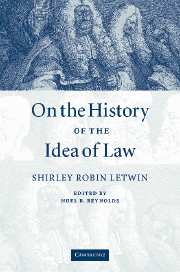Book contents
- Frontmatter
- Contents
- Editor's preface
- Introduction: The idea of law
- Part I Law anchored to a cosmic order
- Part II The Christian revision
- Part III The modern quest
- Part IV The significance of rules
- Part V The idea of law repudiated
- 12 Marxist theories
- 13 Political jurisprudence I: From Realism to feminist jurisprudence
- 14 Political jurisprudence II: Ronald Dworkin
- Part VI New foundations
- Index
13 - Political jurisprudence I: From Realism to feminist jurisprudence
Published online by Cambridge University Press: 22 September 2009
- Frontmatter
- Contents
- Editor's preface
- Introduction: The idea of law
- Part I Law anchored to a cosmic order
- Part II The Christian revision
- Part III The modern quest
- Part IV The significance of rules
- Part V The idea of law repudiated
- 12 Marxist theories
- 13 Political jurisprudence I: From Realism to feminist jurisprudence
- 14 Political jurisprudence II: Ronald Dworkin
- Part VI New foundations
- Index
Summary
The Realist criticism of law which was being nurtured in the 1930s flowered after World War II into what H. L. A. Hart calls “the nightmare theory of law.” It dismissed the conventional image of the judge as an objective and experienced declarer of law, who could and should be sharply distinguished from the legislator, as “an illusion” which was bound to disappoint the expectations which it excited. By the 1960s, the attack on the distinction between judges and legislators became dramatically more far-reaching. Instead of being concerned with merely destroying the myth that judges decided cases in terms of fixed rules, jurisprudence became preoccupied with discovering an altogether novel understanding of adjudication. This effort was most marked in the United States, where discussion concentrated on political scientists' studies of the role of the Supreme Court in constitutional review. But the conclusions carried, and were meant to carry, much broader implications for adjudication generally and for the nature of law.
The new school became known as “political jurisprudence.” They agreed with the Realists that the law consists in the decisions of judges rather than in the contents of statute books. But political jurisprudence added a new insistence on treating judicial decisions as part of the political process. It emphasized that the courts do not belong to a sheltered legal haven; that they are not a “unique body of impervious legal technicians above and beyond the political struggle,” that they are merely one government agency among many, a part of the American political process.
- Type
- Chapter
- Information
- On the History of the Idea of Law , pp. 247 - 275Publisher: Cambridge University PressPrint publication year: 2005



